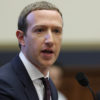Who will win Nobel Prizes in 2022? Wikipedia posits a handful of contenders for Physiology or Medicine, about 20 different possible winners for the Peace Prize and several dozen potential winners of the Literature Prize. But since the Swedish Academy never announces nominees in advance, there are few insights indicating who will win, or even if the eventual winner is on a given list.
Are there ways to predict the future winners?
The Delphi approach, named after the oracle in ancient Greece, gathers multiple rounds of opinions from a group of experts to generate a prediction. Gambling firms provide betting odds on the likelihood that specific competitors will win. Crowdsourced competitions, such as the Yahoo Soccer World Cup “Pick-Em,” have participants predict individual contest winners and then aggregate the results.
Another approach is a prediction market that provides insight into what people expect will happen in the future by creating a stock market-like environment to capture the “wisdom of the crowd.” Groups and crowds often are collectively smarter than individuals when many independent opinions are combined.
As an accounting and information systems professor at the University of Southern California, I investigate issues related to the crowd both in my research and in my teaching. Here’s how prediction markets harness what the crowd thinks to forecast the future.
The wisdom of the market
In prediction markets, participants buy and sell stocks. Each stock’s price is tied to a different event happening in the future. Information about the future is captured in the stock prices.
For instance, in a prediction market focused on the Nobel Peace Prize, maybe Greta Thunberg is trading at $0.10 while Pope Francis is trading at $0.15, and the stocks for the entire group of candidates add up to sum to $1. The prices reflect the traders’ aggregated beliefs about the probability of their winning – a higher price means a higher perceived likelihood of winning.
Prediction markets have various ways of setting stock prices. The Iowa Electronic Markets took following approach during the 2020 U.S. presidential election:
Stock DEM2020 pays off $1 if the Democratic candidate wins, and $0 otherwise,
Stock REP2020 pays off $1 if the Republican candidate wins, and $0 otherwise.
The stock prices capture the probabilities of each candidate winning, in two mutually exclusive events. If the price of DEM2020 is $0.52, then that is treated as the probability of that event occurring – a 52% chance. If DEM2020 is $0.52, then REP2020 is $0.48.
Prediction markets may use real money, or they can use play money. Google’s market used what it called “Goobles,” while the Hollywood Stock Exchange uses Hollywood Dollars. The Iowa Electronic Markets and PredictIt, both sponsored by universities, use real money. Researchers have found that there are no differences in the performance of markets using real money versus those using play…


